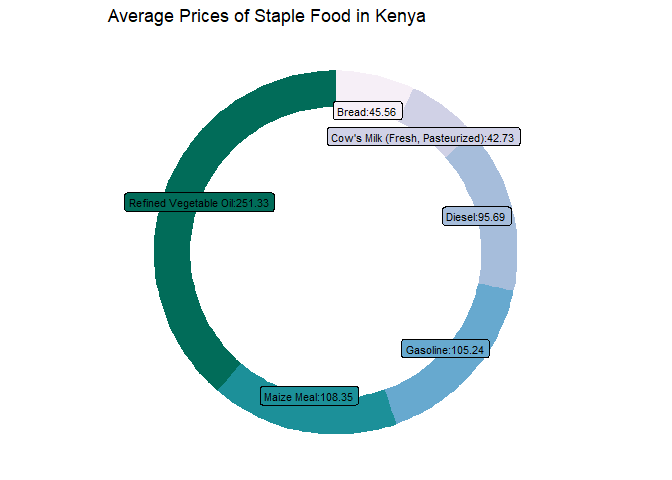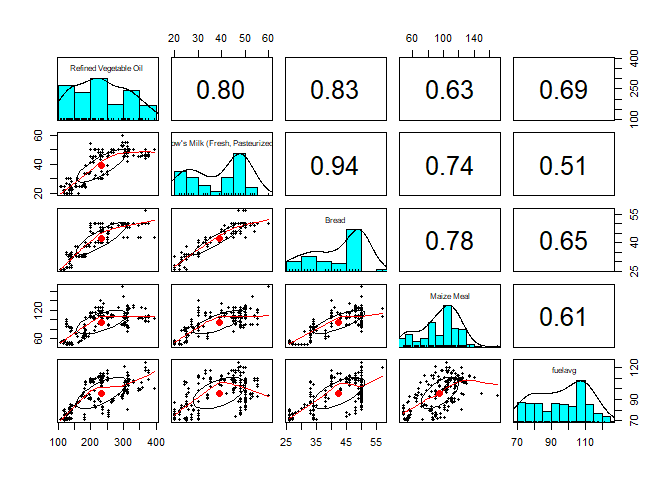Analysis of Staple Food Price in Kenya
This is a simple visualization project on the prices of staple food commodities in Kenya since 2005. The commodities include;
- Refined vegetable oil
- Gasoline
- Cow’s milk
- Diesel
- Maize meal
- Bread
Loading the Dataset and Required Packages
library(dplyr)
library(tidyr)
library(ggplot2)
library(readxl)
library(htmlwidgets)
staple_food_prices_data <- read_excel("staple food prices simplified.xlsx")
Cleaning the variables; changing column types and deleting unnecessary columns
staple_food_prices<-staple_food_prices_data %>%
mutate(period_date=as.Date(period_date),
value=as.numeric(value),
value_one_month_ago=as.numeric(value_one_month_ago),
value_five_years_ago=as.numeric(value_five_years_ago),
value_two_years_ago=as.numeric(value_two_years_ago),
value_three_years_ago=as.numeric(value_three_years_ago),
value_four_years_ago=as.numeric(value_four_years_ago),
value_one_year_ahead=as.numeric(value_one_year_ahead),
value_one_year_ago=as.numeric(value_one_year_ago),
two_year_average=as.numeric(two_year_average),
five_year_average=as.numeric(five_year_average)) %>%
select(-c(price_type,unit,unit_name,unit_type,status,status_changed,
collection_status_changed,start_date))
Interactive Line Plot for the Products
plot<-ggplot(staple_food_prices) +
aes(x = period_date, y = value, colour = product) +
geom_line(size = 0.55) +
scale_color_manual(
values = c(Bread = "#A0522D",
`Cow's Milk (Fresh,
Pasteurized)` = "#00BFFF",
Diesel = "#000000",
Gasoline = "#FF0000",
`Maize Meal` = "#228b22",
`Refined Vegetable Oil` = "#FFA500")
) +
labs(
x = "Period",
y = "Value",
title = "Kenya Staple Food Prices ",
subtitle = "Prices since 2005",
color = "Product"
) +
theme_bw() +
theme(
plot.title = element_text(size = 16L,
face = "bold",
hjust = 0.5),
plot.subtitle = element_text(face = "italic")
)
library(plotly)
foodplot<-ggplotly(plot) %>% layout(yaxis=list(fixedrange=TRUE),
xaxis=list(fixedrange=TRUE))%>%
config(displayModeBar=FALSE)
Average Prices of the products since 2005. This is visualized using a doughnut chart.
avg_prices<-staple_food_prices %>%
drop_na() %>%
select(product,value) %>%
group_by(product) %>%
summarise_at(vars(value), list(Average_Price=mean))%>%
mutate(ratio=Average_Price/sum(Average_Price),
Average_Price=round(Average_Price,2),
cumulative_ratio=cumsum(ratio),
ration_min=c(0, head(cumulative_ratio,n=-1)),
labelPosition=(cumulative_ratio+ration_min)/2,
label=paste0(product, ":", Average_Price))
ggplot(avg_prices,aes(ymax=cumulative_ratio, ymin=ration_min, xmax=4, xmin=3, fill=product))+
geom_rect()+
scale_fill_brewer(palette = 10)+
geom_label(x=3.0,aes(y=labelPosition, label=label),size=3)+
coord_polar(theta="y")+
xlim(c(-1,4))+
labs(title="Average Prices of Staple Food in Kenya")+
theme_void()+
theme(legend.position = "none")

Let’s select some few variables and transform our data set in to wider format. Wide format will help us compare the 6 commodities individually.
food_prices<-staple_food_prices %>%
select(period_date,product,value) %>%
mutate(product=as.factor(product))
food_prices_wide<-food_prices %>%
pivot_wider(names_from = product,
values_from = value)
food_prices_wide$period_date=as.Date(food_prices_wide$period_date)
Fuel prices often affect prices of commodities. To check on this theory, we compute the average price of diesel and gas per observation and compute correlations with other prices. A correlation value above 0.5 indicate towards strong positive association.
library(psych)
food_prices_wide %>%
select(-period_date) %>%
drop_na() %>%
mutate(fuelavg= (Diesel+Gasoline)/2) %>%
select(-c(Diesel,Gasoline)) %>%
pairs.panels()

From the plot, all products indicate a correlation value of higher than 0.5. This confirms the claim that fuel prices in deed impact prices of other commodities.
Find the data and on my github reporsitory.